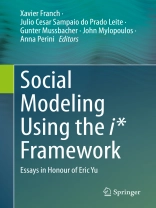This book is based on a symposium to celebrate Eric Yu, the inventor of the i* framework, held on the occasion of his retirement and collocated with the 31st IEEE International Requirements Engineering Conference. The notion of social modeling emerged in the mid-nineties as a powerful conceptual approach to intricately analyze and specify complex social ecosystems, wherein strategic actors collaborate and depend on each other in order to attain their goals. The i* framework was designed precisely for this purpose, rapidly establishing itself as the de facto standard in the requirements engineering and information systems communities. The invited chapters, which were all written by highly acclaimed researchers, aim to give testimony to the impact of Eric’s work during the last 30 years of research and practice in requirements engineering (RE) and at the same time reflect on current development as well as future prospects.
The content of the book is structured into five sections, relative to the relationship of each chapter to the i* requirements modelling language. The first four sections cover retrospectives and reflections on i*, empirical research studies on i*, i* modelling language variants, and applications of i* to address open research challenges. The last section presents a chapter – written by Eric Yu himself – on a vision how i* could foster the transition towards a new RE paradigm, i.e., RE as Augmenting Aspiring Selves, a paradigm that should better fit with the needs of RE for AI-based systems.
This compiled collection of retrospective, ongoing and forward-looking scholarly essays centered on the i* framework furnishes its readers with a holistic vision of social modeling through i*, encompassing its versatile applications across different domains, challenges, and scenarios.
Innehållsförteckning
Part I: Retrospectives.- i* or not i*, this was the question”.- From i* to the User Requirements Notation.- Part II: Empirical Studies.- i* for Sustainability: A Case Study in Urban Management.- From Goal Models to Know-how Mapping.- Part III: Variants.- Definition and use of i Star 2.0.- Towards an i Star 2.0 Extension for Analyzing Goal Variability.- Goal Oriented Modeling of Safety-Critical Systems.- Social Dependency Relationships and their Role in Social Modelling Languages.- Part IV: Applications.- Influence maps: Exploring the dependencies between ‘soft’ and ‘hard’ requirements.- Data Analytics from a Social Perspective.- 50 Shades of Governance: Using Conceptual Modeling to Set-up Structures Ensuring Digital-Business Alignment.- Using i* to Analyze Ethicality Requirements.- Part V: Visions.- Agent-Oriented Modeling for the Age of AI – Nine Pivots towards a Reconceptualization of Requirements Engineering.
Om författaren
Xavier Franch is Professor at the Polytechnical University of Catalonia, Spain. He works in the requirements engineering field since the mid-nineties, being General Chair, Program Chair and Most Influential Paper awardee in the two main conferences in the area, IEEE RE and REFSQ. Xavier started to use i* in his research in 2003. In 2013, together with John Mylopoulos and Eric Yu, they formed the i* workshop Advisory Committee, still active at the moment of publishing this book. Xavier is member of the Academia Europaea (since 2022) and IREB Full Member and Council Member (as vice-chair since 2019).
Julio Cesar Sampaio do Prado Leite is visiting professor at the Institute of Computing at UFBA, CNPq Senior Researcher, IEEE Lifetime Member, founding member of SBC, ACM Member, recipient of the IEEE Computer Society (Requirements Engineering) ’Lifetime Service Award’, member of IFIP Working Group 2.9 (Software Requirements Engineering), and member of the editorial board of the Requirements Engineering Journal. He also was a visiting professor at the University of São Paulo (ICMC), visiting professor at the Universität Kaiserslautern, visiting scientist at the Fraunhofer IESE, visiting professor at the ECI of the Universidad de Buenos Aires, visiting scholar at the University of Toronto, and visiting scientist at the Università degli Studi di Trento. For thirty years he has been an academic member of PUC-RIO and UERJ.
Gunter Mussbacher is Associate Professor at Mc Gill University, Montreal, Canada. He has been active in requirements engineering research for more than twenty years. He is co-founder, organizer, and steering committee member of the Mo DRE workshop series at IEEE RE and has served the IEEE RE community in many roles, including Finance Chair (2015) and Program Co-Chair (2022). From 2005 to 2021, he was first Editor and then Associate Rapporteur at the International Telecommunication Union (ITU), responsible for the User Requirements Notation (URN) which is the first and only international goal-modeling standard, inspired by the i* framework.
John Mylopoulos holds a professor emeritus position at the Universities of Toronto and Trento, and is working at the University of Ottawa on a project titled “Engineering Smart Contracts” as visiting researcher. He earned a Ph D degree from Princeton University in 1970 and joined the faculty of the Department of Computer Science at the University of Toronto the same year. His research interests include conceptual modelling, requirements engineering, data semantics and knowledge management. John is a fellow of the Association for the Advancement of Artificial Intelligence (AAAI) and the Royal Society of Canada (Academy of Applied Sciences). He has served as program/general chair of international conferences in Artificial Intelligence, Databases and Software Engineering, including IJCAI (1991), Requirements Engineering (1997, 2011), and VLDB (2004). John was project leader for a project titled ’Lucretius: Foundations for Software Evolution”, funded by an advanced grant from the European Research Council (2011-16).
Anna Perini is distinguished fellow at Fondazione Bruno Kessler (FBK), Trento, Italy. Prior to this, she was senior researcher at the Software Engineering research unit of FBK, leading research in requirements engineering till 2021. Anna is active in the requirements engineering research community for more than twenty years. She served as Program Chair of the two main conferences in the area, IEEE RE (2019) and REFSQ (2017). She started to use i* in her research in 2001, collaborating with John Mylopoulos and Eric Yu.












